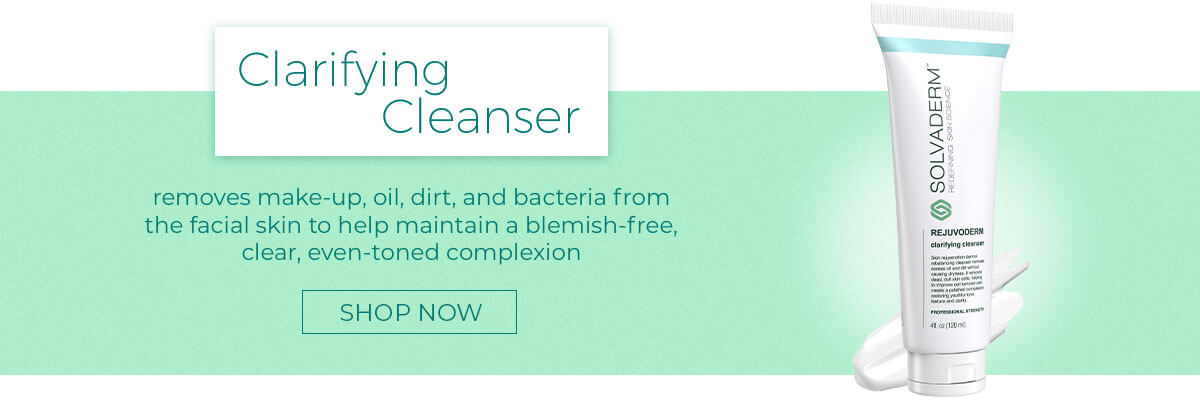When it comes to your skincare routine, using a quality facial cleanser twice daily is essential for a healthy complexion. This should be the first step in your regimen both morning and evening. What is a cleanser? Cleansers remove dirt, oil, dead skin cells, and makeup to prevent clogged pores, improve circulation, and prepare your skin to optimally absorb other products.
In this article, we’ll discuss the benefits of using a good cleanser, how they work, optimal ingredients, how to use a cleanser, and provide you with some excellent recommendations for highly effective facial cleansers.
What is a Cleanser?
If you don’t follow a consistent skincare routine, you may be wondering, “What is a cleanser?” In basic terms, a cleanser is simply a product designed to clean the surface of your skin, eliminating dirt, makeup, excess oil, dead skin cells, or other impurities like pollution.
Cleansers can unclog your pores, helping to prevent breakouts, and they also freshen your skin. These products can improve blood flow, which helps to promote radiance and glow. As the first product in your morning and evening routine, the best facial cleanser formulas prepare your skin to better absorb other products in your regimen for more potent benefits.
The Importance of a Quality Cleanser
The quality of the facial cleanser you choose is extremely important, and in particular, the ingredients included in the formula. Select a product with gentle ingredients that have benefits backed by scientific studies. Some of the products on the market contain harsh substances or additives that could irritate the skin. Avoid formulas that have sulfates, parabens, phthalates, and artificial fragrances or additives.
As cleansing is the first step in your routine and it prepares your skin for the follow-up, it’s important to use the best facial cleanser you can find. If you don’t thoroughly remove the dirt from your face it can lead to clogged pores, breakouts, and ultimately signs of age.
The Science of Facial Cleansers
What is a cleanser, and how do they work? Cleansers include one or more ingredients that are surfactants, compounds that remove dirt, sebum, dead skin cells, and other impurities from the surface of the skin and from the pores. This helps prevent acne breakouts, and according to one research review [1] using a cleanser regularly may also help treat some dermatological disorders.
The best facial cleanser formulas also contain humectants to boost hydration levels and strengthen the moisture barrier and antioxidants that repair damage and protect the complexion from environmental pollutants.
Quality cleansers also improve circulation for a healthier, more glowing complexion, and many contain soothing, conditioning ingredients. A review article in the Journal of Cosmetic Dermatology [2] discussed the science behind skincare cleansers.
Cleanser vs. Face Wash: Which is Better and Why?
We’ve only partially answered the question, “What is a cleanser?” at this point. Not to confuse you, but there is more than one option: facial cleanser or facial wash. A cleanser is usually a cream or oil, and it primarily serves to hydrate your skin, remove impurities, and soothe the complexion.
Facial wash is water-based and tends to come in the form of foam, gel, or bar that lathers. It’s designed for deep cleansing of the pores to remove all dirt, excess oil, and dead skin cells thoroughly. So, cleanser vs face wash: which is better? The answer really depends on your specific skin type.
If you have normal or dry skin, the best option for you is a facial cleanser. It will cleanse your pores, increase hydration, and support your moisture barrier without overwashing. If you have an oily skin type or suffer from frequent acne breakouts, a facial wash is your best bet.
How to Properly Wash Your Face: 7 Simple Steps
Now that you have a full answer to the question, “What is a cleanser?” it’s important to understand the best process for washing your face to achieve optimal skin health benefits. Follow these 7 simple steps for a fresh, hydrated, cleansed complexion daily.
-
Use a gentle, non-abrasive cleanser: Choose a product with gentle, non-irritating ingredients and free of harmful additives that could strip your skin of essential oils. We highly recommend Rejuvoderm Clarifying Cleanser as the first step in your morning and evening skincare routine. It cleanses and gently exfoliates, boosts hydration, and improves skin elasticity and firmness.
-
Remove all your makeup: Prior to applying your cleanser, carefully take off your makeup using a quality makeup remover. The cleanser will remove the remaining traces, but it’s important to get rid of most of your makeup prior to cleansing.
-
Wet your skin with lukewarm water: Hydrate your skin lightly by splashing lukewarm water on your face prior to cleansing. Avoid very hot water as it can remove key oils that are essential for your skin’s health.
-
Rub cleanser onto your skin with your fingers: It’s important to know how to use a cleanser correctly, to get the best benefits. Take a small amount of the product onto your fingers, about the size of a quarter, and massage it gently into your skin for about a minute without over-scrubbing.
-
Rinse your skin and pat it dry: Use lukewarm water again to rinse the cleanser off your skin, and then very gently pat your skin dry with a towel. Avoid rubbing or scrubbing, as it could cause irritation.
-
Apply a toner to even out your skin tone: Follow up your cleanser with Maxatone Clarifying Face Toner to deep clean your pores of remaining dirt, oil, makeup, and dead skin cells, decrease your risk of breakouts, and soothe the complexion.
-
Moisturize your skin: After you apply toner, use a deeply hydrating formula like Infusoderm Deep Hydration Daily Moisturizer to refresh and nourish your complexion. This powerful formula hydrates the skin, plumps, and helps smooth signs of age for a youthful, radiant complexion.
The Best Facial Cleanser Ingredients for Each Skin Type
Make sure you know your skin type, and choose a product suited to the needs of your complexion. These are some of the best facial cleanser ingredients for each type:-
Normal Skin: For normal skin, look for a cleanser with gentle exfoliants like lactic and glycolic acid to thoroughly clean and refresh the skin, as well as hydrating ingredients like hyaluronic acid or essential oils to deeply moisturize. Use a face cleanser in the morning and a fash wash at night for a deeper clean of pores.
-
Oily Skin: If you have oily skin and are debating cleanser vs face wash, we recommend the stronger wash to really rid your pores of all impurities and help prevent breakouts. Choose a formula with either retinoids or salicylic acid for best results. Gentle fruit acids like lactic and glycolic acid also provide benefits, as do hydrating ingredients.
-
Dry Skin: A cleanser for dry skin should include deeply hydrating ingredients like glycerin and hyaluronic acid, as well as agents that strengthen the moisture barrier such as ceramides.
How Frequently Should You Use a Facial Cleanser?
Most dermatologists recommend that you wash your face twice daily, once in the morning and again in the evening as the first step in your skincare routine. One study [3] concluded that washing the face twice a day for 2 weeks with a gentle cleanser improved acne symptoms in participants. Washing more often is not effective, as it could strip your skin of the key natural oils it requires to stay hydrated and healthy. In addition, make sure to cleanse gently without over-scrubbing. For best results, follow our 7-step instructions for how to use a cleanser.
Frequently Asked Questions
How to Double Cleanse Your Skin?
What is double cleansing the skin? If you’ve been debating the merits of cleanser vs face wash, you should know that you can use both. With double cleansing, you begin with a more gentle facial cleanser and then follow up with a facial wash to reach the rest of the impurities, deeply cleanse pores, and leave your skin fresh.
Should You Use a Cleanser Every Day?
Yes, according to most dermatologists, you should wash your face with a cleanser twice daily, morning and evening. What is a cleanser? This is a skincare product designed to remove dirt, dead skin cells, and oil from the skin’s surface and from your pores.
How Do You Know If You're Over-Cleansing?
If your skin feels tight after you use your cleanser, almost too clean, it’s a clear sign you are over-cleansing. This occurs because key oils have been stripped from your skin, which could lead to dryness. Follow our 7-step method for how to use a cleanser for optimal benefits.
Conclusion
Cleansers are an important part of your twice-daily skincare routine, and regular use is essential for a healthy complexion. In this article, we have answered the question, “What is a cleanser?” in some detail, and given you a highly effective 7 step method for correctly cleansing your complexion with high-quality skincare recommendations. Follow it consistently using ingredients and products that suit your skin type and watch your skin glow with health and youthfulness.
References
1] ↑ https://www.ncbi.nlm.nih.gov/pmc/articles/PMC3088928/
2] ↑ https://onlinelibrary.wiley.com/doi/10.1111/jocd.12469
3] ↑ https://www.solvadermstore.com/blogs/skin-care/what-is-cleanser
Mentioned in this article
More stories

Korean Glass Skin: What Is It and How To Achieve It?





